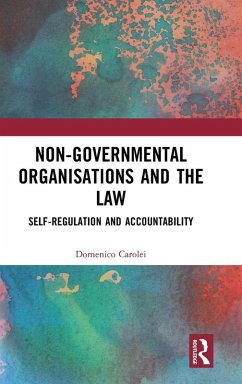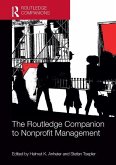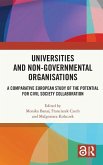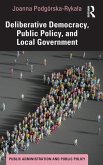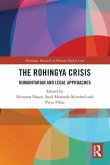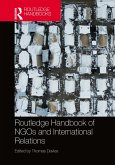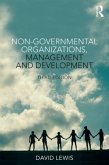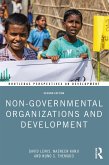This book examines accountability issues and the problems of regulating non-governmental organisations (NGOs) through self-regulation. It focuses on methods of self-regulation for NGOs in response to prominent scandals that revealed problems with their accountability, notably the 'Mafia Capitale' scandal in Italy and the Oxfam GB scandal in Haiti. It also touches upon other accountability failures, including the allegations against the WWF of facilitating human rights abuses of indigenous groups in Cameroon.
The work brings a legal approach to the topic of NGO self-regulation and accountability, contributing to the academic and policy debate in several ways. It advances a brand-new theoretical model to explain the reasons behind NGOs non-compliance with self-regulation, examines the reasons for self-regulation failures, identifies new accountability routes, and recommends proposals for sectoral reform.
The book will be of great interest to scholars, researchers and PhD students who work in the area of NGO regulation and accountability from a legal perspective as well as to accountability and NGO scholars working in other disciplines. It will also appeal to practitioners and policymakers who work on the development of NGO policies.
The work brings a legal approach to the topic of NGO self-regulation and accountability, contributing to the academic and policy debate in several ways. It advances a brand-new theoretical model to explain the reasons behind NGOs non-compliance with self-regulation, examines the reasons for self-regulation failures, identifies new accountability routes, and recommends proposals for sectoral reform.
The book will be of great interest to scholars, researchers and PhD students who work in the area of NGO regulation and accountability from a legal perspective as well as to accountability and NGO scholars working in other disciplines. It will also appeal to practitioners and policymakers who work on the development of NGO policies.
'(...) the book is a very valuable one. Despite their enormous international significance, the regulation of NGOs, as they work and operate internationally, has not before been the subject of an extended legal study. Carolei's important analysis corrects that omission.'
Jonh Picton, University of Manchester, in the Voluntary Sector Review
'This book provides an excellent contribution to a topic that has been dealt several times in different environments in recent years. However, the volume by Domenico Carolei fills a gap since through an in-depth analysis, that is the result of a serious research, it offers an all-encompassing picture of the main legal issues regarding accountability of non-governmental organisations, increasingly relevant and sometime indispensable actors in internal as well as international affairs. The overall message is that law, in all its manifestations, matters when accountability is at stake; if both States and NGOs take this message without reservations, they will improve their mutual relations and shape a constructive and more solid role of NGOs in both national and international environment.'
Giuseppe Nesi, University of Trento, member of the UN International Law Commission
Jonh Picton, University of Manchester, in the Voluntary Sector Review
'This book provides an excellent contribution to a topic that has been dealt several times in different environments in recent years. However, the volume by Domenico Carolei fills a gap since through an in-depth analysis, that is the result of a serious research, it offers an all-encompassing picture of the main legal issues regarding accountability of non-governmental organisations, increasingly relevant and sometime indispensable actors in internal as well as international affairs. The overall message is that law, in all its manifestations, matters when accountability is at stake; if both States and NGOs take this message without reservations, they will improve their mutual relations and shape a constructive and more solid role of NGOs in both national and international environment.'
Giuseppe Nesi, University of Trento, member of the UN International Law Commission

